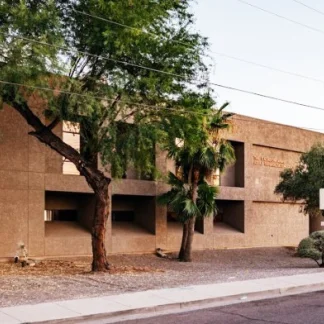Jewish Family Service
Jewish Family & Children's Services (JFCS) is a substance abuse and mental h...
The Salvation Army is a nonprofit Christian substance abuse treatment program in Phoenix, Arizona. This is a faith-based program designed to provide support for clients facing extreme difficulties in their lives. They serve adult clients.
The Salvation Army’s program is provided to qualifying clients at no cost. Instead, clients work in a Salvation Army program while receiving treatment in rehab. Services are offered in a residential treatment format.
Clients in the rehab program receive lodging at a Salvation Army location. During this time, their needs are taken care of by staff, and they are supervised 24 hours a day. Though this is a faith-based program, clients are not discriminated against for any reason, including religion.
Clients in this program participate in individual and group counseling to help them understand and address their problems. Clients can also participate in various recreational programs.
Work therapy is a major component of the program. Work therapy helps clients reintegrate into their communities and develop critical work and life skills. This also helps clients heal by providing structure for their days. Clients are given lodging and therapy services in exchange for their work at the Salvation Army.
The Salvation Army’s rehab program is provided free of charge. However, when considering other treatment programs, clients should confirm coverage with their insurance plan, because in network and out of network benefits may vary.
Contact us for more information: (602) 256-4500

Connect with The Salvation Army by calling their admissions team directly.
(602) 256-4500 Website Get DirectionsResearch clearly demonstrates that recovery is far more successful and sustainable when loved ones like family members participate in rehab and substance abuse treatment. Genetic factors may be at play when it comes to drug and alcohol addiction, as well as mental health issues. Family dynamics often play a critical role in addiction triggers, and if properly educated, family members can be a strong source of support when it comes to rehabilitation.
Group therapy is any therapeutic work that happens in a group (not one-on-one). There are a number of different group therapy modalities, including support groups, experiential therapy, psycho-education, and more. Group therapy involves treatment as well as processing interaction between group members.
Group therapy is any therapeutic work that happens in a group (not one-on-one). There are a number of different group therapy modalities, including support groups, experiential therapy, psycho-education, and more. Group therapy involves treatment as well as processing interaction between group members.
Jewish Family & Children's Services (JFCS) is a substance abuse and mental h...
Southwest Behavioral Health - Erickson Outpatient is a behavioral health care an...
Banner - University Medicine Behavioral Health, located in Phoenix, Arizona, off...
Rehabilitation Services Administration - East Willetta Street, located in Phoeni...